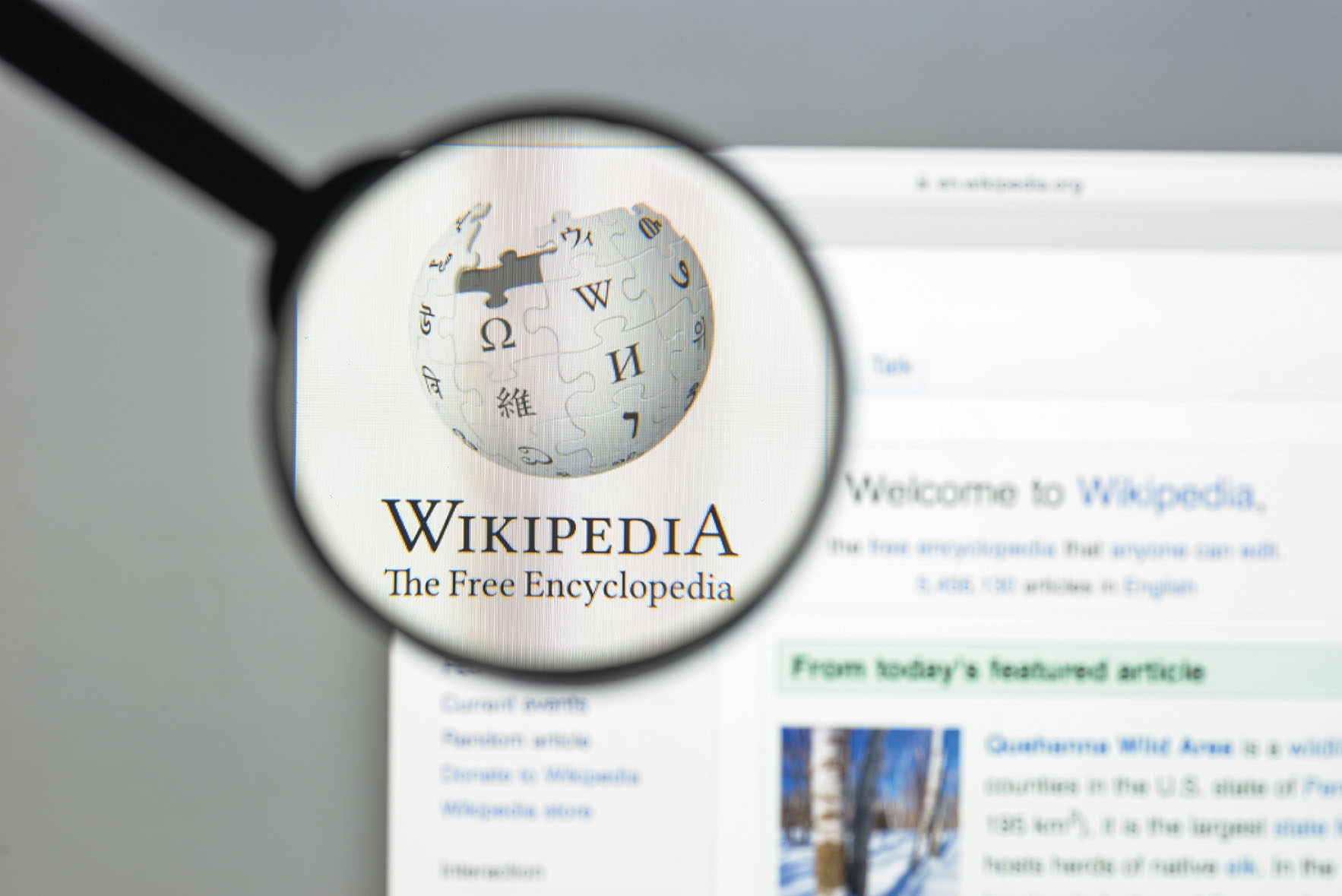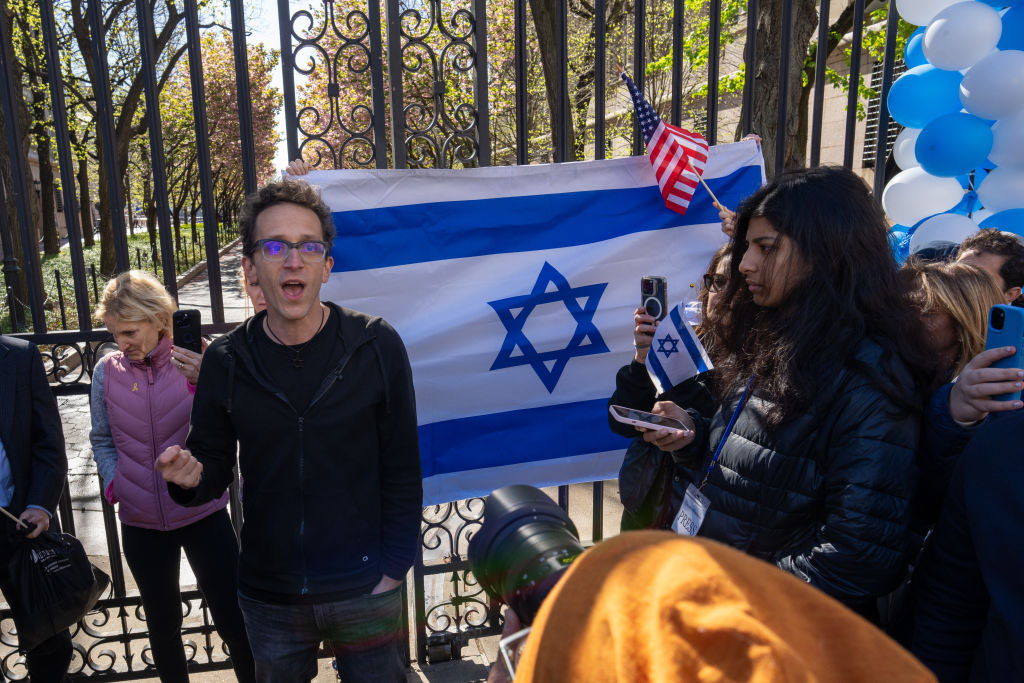 Casimiro_PT/Deposit Photos
Casimiro_PT/Deposit Photos “Numerous commentators have identified the broader context of Israeli occupation as a cause of the [Israel-Hamas] war. The Associated Press wrote that Palestinians are ‘in despair over a never-ending occupation in the West Bank and suffocating blockade of Gaza.’ Several human rights organizations, including Amnesty International, B’Tselem and Human Rights Watch have likened the Israeli occupation to apartheid, although supporters of Israel dispute this characterization.”
This quote, which seems to have an anti-Israel slant, is actually from the “Israeli policy” part of the background section on the main Wikipedia page documenting the ongoing Israel-Hamas war. One editor who has run afoul of Wikipedia’s policies in the past and, like all of the editors quoted here, requested anonymity to discuss the site’s practices, told me that Wikipedia’s coverage related to Oct. 7 as being rather anti-Israel “despite the best efforts of many pro-Israel and more unbiased editors.”
Dr. Shlomit Aharoni Lir wrote in a research paper published by the World Jewish Congress that the “Israel-Hamas war” Wikipedia article received 25,401 page views on Jan. 20 alone and that 70% of the time Wikipedia is the first result to pop up when people search for current events on Google, Bing and DuckDuckGo. More recent statistics show that the Israel-Hamas war article received nearly a million views throughout the month of April. Clearly, people are looking to Wikipedia for information on the war.
Statistics show that the Israel-Hamas war article received nearly a million views throughout the month of April. Clearly, people are looking to Wikipedia for information on the war.
That’s why examining Wikipedia content and how the site operates matters — it is the world’s go-to site for information. I have been investigating Wikipedia for more than three years, having talked to many Wikipedians about how the site’s mechanisms have created a self-sustaining system of left-wing and anti-Israel bias.
How Wikipedia Works
Wikipedia operates through “consensus,” which is defined as “a process of compromise” that “neither requires unanimity … nor is the result of a vote.” However, editors I have talked to have consistently referred to consensus as a numbers game.
“Officially we will all say that consensus isn’t a vote,” one editor told me. “However, I think most editors will also concede that sometimes it does come down to numbers and a lot of editors would tend to see anything over two-thirds to be consensus if the strength of the arguments was approximately equal.” But determining consensus “is harder when both sides are making policy-based arguments and perhaps the policy argument of one side seems a bit stronger but the numbers of the other side are greater.”
These battles for consensus can often be seen on an article’s talk page (every Wikipedia article has one) and various noticeboard discussion threads on Wikipedia. Sometimes when editors can’t reach an agreement on a disputed change they will hold a Request for Comment (RfC), which opens up the debate to a broader community discussion. At the end of the discussion, a “closer” (an uninvolved administrator or editor in good standing) renders a verdict on if there’s consensus for the proposed change. A bot will automatically remove the RfC tag after 30 days, but the RfC can be closed sooner or later depending on whether or not editors believe more input is needed.
As we will see in the following seven examples, consensus appears to lean toward the Palestinian narrative.
1. Part of the “Background” section of the “Israel-Hamas war” Wikipedia article states: “Numerous commentators have identified the broader context of Israeli occupation as a cause of the war.” These “commentators” are mostly anti-Israel figures, in my opinion.
An editor who voluntarily stopped editing Wikipedia years ago after getting fed up with what they believed was bias from the site’s administrators told me that “numerous commentators” is the kind of “positively loaded language” that Wikipedia advises against using. “It implies there are a lot of people saying it, when in fact all they have is [five] sources they stringed together,” the editor told me in an email. “What does ‘numerous commentators’ mean … What are their credentials?”
Three of these commentators are:
- Far-left Squad members Reps. Rashida Tlaib (D-Mich.) and Cory Bush (D-Miss.) calling for ending aid to Israeli “apartheid” in an article in The Hill.
- University of Chicago Prof. John Mearsheimer, who in an Al Jazeera interview accused Israel of “apartheid” and wanting to “ethnically cleanse” the Gaza Strip and West Bank. The Atlantic’s Jeffrey Goldberg criticized Mearsheimer for praising a book by Gilad Atzmon in 2011; Goldberg accused Atzmon at the time of promulgating antisemitism. (Mearsheimer subsequently defended Atzmon from those charges in a rebuttal to Goldberg in Foreign Policy magazine.) Mearsheimer has also co-authored a book alleging that the “Israel lobby” helps control American foreign policy.
- Palestinian writer Mariam Barghouti’s Al Jazeera op-ed, “On October 7 Gaza broke out of prison.”
The remaining two are from The Nation and +972 Magazine, the latter of which NGO Monitor describes as being on “the fringes of Israeli discourse,” although Wikipedia does not consider NGO Monitor a reliable source. The citation from The Nation at least states that Hamas’ atrocities on Oct. 7 aren’t “meant to achieve the basic Palestinian right to freedom … it’s an act that inevitably leads to an Israeli response of death and destruction against the ordinary Gaza citizens, the people they are supposed to represent and care for.”
Middle East historian Asaf Romirowsky, who heads Scholars for Peace in the Middle East and the Association for the Study of the Middle East and North Africa (ASMEA), told me that these sources “are recycling the same echo chamber that is basically Palestinian propaganda … the bias is clear.” But you wouldn’t know who exactly these sources are unless you checked the citation references to the line.
“Opinion pieces need to be attributed … I would change it to ‘a few commentators, including Rashida Tlaib and Mariam Barghouti,’” the editor told me, adding that “it’s more precise and shows exactly who the people making this comment are.”
A different editor disagreed with the “positively loaded language” assessment, but agreed that the line was “POV.” Another editor told me, “I don’t know that there is ever a ‘correct’ way to do this … This is a case where an editing choice isn’t made by rational policy but instead by weight of numbers.”
2. Adding “anti-imperialism” into Hamas’ list of ideologies and removing “antisemitism” in the Hamas Wikipedia article’s infobox.
Google “Hamas ideology,” and you’ll find that the list of ideologies for the terror group include “anti-Zionism” and “anti-imperialism” but not “antisemitism” — all of which comes straight from the “infobox” of the Hamas Wikipedia article.
Wikipedia describes infoboxes as summarizing “important points in an easy-to-read format” in the upper-right hand corner of articles. Until recently, the Hamas Wikipedia article listed “antisemitism” as one of the ideologies for the terror group. It was removed in January 2024 after enough editors on the talk page argued that there aren’t enough scholarly sources that list antisemitism as a “central ideological tenet” of Hamas, especially after Hamas revised its charter in 2017 to state they don’t take issue with Jews, their issue is with Zionists. Of course, the revised document still clearly contains antisemitic tropes (a viewpoint buried in the body of the Wikipedia article) and Hamas didn’t really revise their charter in 2017; they simply added a new document that does not supersede their original 1988 antisemitic charter, according to the Foundation for Defense of Democracies.
Until recently, the Hamas Wikipedia article listed “antisemitism” as one of the ideologies for the terror group. It was removed after enough editors on the talk page argued that there aren’t enough scholarly sources that list antisemitism as a “central ideological tenet” of Hamas.
“Anything can go in the infobox,” an editor told me. “Nobody has ever claimed it has to be a ‘central tenet,’ all it needs to be is something mentioned fairly often.”
And Hamas’ antisemitism does seem to be mentioned fairly often in academic literature — before its removal from the infobox, the “antisemitism” label was sourced to a piece by George Mason University Professor Bruce Hoffman in The Atlantic and a 1998 academic journal article by Tel Aviv University Professor Meir Litvak. At one point, even more sources were cited, including a 2023 Portuguese Journal of Asian Studies article and a 2020 book from an independent academic publisher.
“Antisemitism has been part and parcel of Hamas’ narrative,” Romirowsky told me. “Their clear goals and objectives vis a vis the 1988 charter have not changed. So the demand for the destruction for the killing of Jews through jihad and the obliteration of the state of Israel, all of that is current and clearly we’ve seen it Oct. 7. So there’s nothing new to my mind, anything short of that is a blatant lie.”
Tel Aviv University Vice Rector Eyal Zisser told me in a Zoom interview the notion that antisemitism is not a central tenet of Hamas was “ridiculous,” noting that under the International Holocaust Remembrance Alliance definition, it is antisemitic to oppose the right of the Jewish people to have a state. “It’s clearly what Hamas is after,” he said.
Consider that in the RfC asking if “anti-imperialism” should be included in the Hamas infobox, no one discussed if it’s a “central ideological tenet” of Hamas. The argument here that rallied votes in favor was that it was mentioned in several academic books, with one being a “radical” leftist nonprofit publisher that provided a “Free Palestine! Starter Kit” on their website in 2021. Op-eds (which are considered weaker sources) from sources like historian
Simon Sebag Montefiore in The Atlantic and freelance journalist Joseph Bouchard in The National Interest criticizing those who excused Hamas’ actions on Oct. 7 as being “anti-imperialist,” as well as a CNN Portugal op-ed arguing that Hamas is spreading Islamic imperialism and an interview in El Pais in which philosopher John Gray says Hamas “has more in common with ISIS” were cited to argue that there should be a “disputed” tag next to the “anti-imperialism” descriptor; these sources were dismissed as being “biased and partisan.” The closer ruled that while the couple of editors who argued for the “disputed” tag “made cogent points, these did not attain sufficient support to sway the consensus that way.”
Romirowsky called the use of “anti-imperialism” to describe Hamas as “hogwash.” “That’s the Palestinian narrative that has been insidious toward how they view the entire Israeli-Palestinian conflict,” Romirowsky said, adding that Hamas “would like to define themselves as a resistance movement.”
“The Palestinian narrative has been insidious toward how they view the entire Israeli-Palestinian conflict.” Hamas “would like to define themselves as a resistance movement.” – Asaf Romirowsky
Zisser’s view? “Any Islamic terrorist organization is committed to fight the West because it’s the West, it’s Christian … to say that it’s ‘anti-imperialist,’ well you know, Hitler fought against Britain and the United States … can you say that he was anti-imperialist? It’s ridiculous.”
An editor told me that they believe there should be a “disputed” tag next to the anti-imperialism descriptor and that “it should be stated in plain English” in the article. “Putting it in the infobox is a trick to avoid expanding on the issue,” the editor said. Indeed, Hamas’ supposed “anti-imperialism” stance is not mentioned anywhere in the body of the article.
The editor contended that the removal of “antisemitism” from the infobox and the adding of “anti-imperialism” is “an example of abusing the system by virtue of having the numbers, which results in a biased article.”
3. Treating the Hamas-run Gaza Health Ministry’s numbers as being reliable.
A look at the Israel-Hamas war Wikipedia article shows that it cites the casualty numbers from the Hamas-run Gaza Health Ministry (without the “Hamas-run” qualifier) without any question, but does provide a citation to the report that the United Nations halved the number of identified women and children.
Of course, there have been criticisms of the Health Ministry’s numbers circulating in some media: a March 6, 2024 piece in Tablet Magazine by Abraham Wyner, a renowned statistician at The Wharton School of the University of Pennsylvania, alleged that the Hamas-run Gaza Health Ministry’s casualty numbers “are not real.” Wyner examined the numbers released by the ministry from Oct. 26-Nov. 10 showing the “daily casualty figures that include both a total number and a specific number of women and children.” Using graphs, Wyner showed how the daily death total during that time frame had “strikingly little variation” when he believes “there should be days with twice the average or more and others with half or less.” Additionally, the figures show no correlation between women’s and children’s deaths when there should be a positive correlation between the two. The data also shows a negative correlation between female deaths and male deaths when there should be a high correlation between the two, per Wyner, because “the ebbs and flows of the bombings and attacks by Israel should cause the daily count to move together.”
Further, the ministry’s data that stated that 70% of the death count in Gaza are women and children (which the UN now says is 52% based on confirmed identities) doesn’t add up since 25% of Gaza’s population are adult males and that Hamas has acknowledged in February to losing 6,000 terrorists, “which represents more than 20% of the total number of casualties reported,” wrote Wyner. “Taken together, Hamas is reporting not only that 70% of casualties are women and children but also that 20% are fighters. This is not possible unless Israel is somehow not killing noncombatant men, or else Hamas is claiming that almost all the men in Gaza are Hamas fighters.” These “anomalies” led Wyner to conclude that the health ministry’s number reporting process is “unconnected or loosely connected to reality.” It is worth noting that the 6,000 figure came from a Hamas official’s statement to Reuters, but Hamas denied the accuracy of the figure to the BBC.
But you can only find Wyner’s piece in the lesser-trafficked “Gaza Health Ministry” article rather than the more heavily trafficked “Israel-Hamas war” and “Casualties of the Israel-Hamas war” articles. When Wyner’s piece was suggested on the Israel-Hamas war talk page, Wikipedians insisted that including it would run afoul of various Wikipedia policies; these policies included that Wikipedia should not give credence to fringe theories (WP:FRINGE in wiki-shorthand) or give undue weight (WP:UNDUE) to a minority viewpoint, as Wikipedia reflects the preponderance of reliable sources.
Most editors pointed to the fact that many reliable sources like The Lancet (an academic journal) have concluded that the ministry’s data is reliable, thus Wikipedia should also and contended that Tablet is not a great source. Other Wikipedians argued in a separate thread that Wyner’s data was cherrypicked because the total death count on other days outside of Wyner’s timeframe showed greater variance and that Wyner’s own timeframe had a higher variance than he let on. Editors also argued the World Health Organization and organizations like Human Rights Watch also believe the ministry’s numbers are reliable. In the Gaza Health Ministry Wikipedia article, Wyner’s piece is mentioned but hit with criticism; preceding it are the two Lancet studies calling the ministry’s numbers reliable and following it is a paraphrase of Professor Michael Spagat saying that the ministry’s numbers “have declined over time, due to Israeli attacks on hospitals, and thus the MoH is relying on first responders and media sources.”
For his part, Wyner denies cherry-picking data, telling me that those were the only dates he could find “contiguous data available that had breakdowns into categories” of the deaths of men, women and children. “The categories are important since Hamas, I allege, is hiding the male deaths or miscataloging them as children or women and that would only be noticeable when the counts by category are released,” Wyner said.
One editor I spoke to argued that “Tablet is a reliable source, and a professor of statistics is an expert in the field, so it doesn’t matter what editors think about the numbers or if he’s cherry-picking or whatever” (though another source said “it’s absolutely allowed to question something on the talk page”)and that Wyner’s view is not in the extreme minority because “a lot of people say Hamas lies about the numbers” and that it “should be in any article that mentions the numbers.”
And more sources do appear to be questioning the reliability of the health ministry: The Telegraph questioned the conclusion of one of The Lancet’s studies that the health ministry’s numbers are accurate, as the study cross-referenced the ministry’s numbers with the number of United Nations Relief and Works Agency for Palestinian Refugees (UNRWA) workers killed in a separate database. However, The Telegraph noted that the study “was not peer reviewed and the authors themselves acknowledge that the UNRWA database is not likely to be exactly representative of the wider Gazan population.” The Telegraph reviewed UNRWA’s data and also determined that “there are significant discrepancies between” the reported UNRWA staff deaths and the total deaths reported by the ministry and that “men appear to account for a considerably higher percentage of fatalities than that claimed by the Gazan authorities.” Three academics in the British Israel Communications and Research Centre’s Fathom Journal, which cited Wyner, also questioned the reliability of the Gaza Health Ministry’s death toll, though this source was also dismissed on the Israel-Hamas war talk page. Even the Health Ministry itself recently admitted that about a third of its statistics are “incomplete,” though this is acknowledged in the Gaza Health Ministry and “Casualties of the Israel-Hamas War” articles.
Romirowsky, who knows Wyner, called the Wharton professor “a phenomenal statistician” who “did a great job in that piece.” Hamas’s goal “is to inflate the numbers… the narrative is clear and designed from the get-go.” However, Romirowsky acknowledged that a lot of academic sources (including The Lancet) and media sources do treat the Gaza Health Ministry’s numbers as reliable, so this very well could be an example of Wikipedia reflecting the bias of the media and academia.
4. Considering Mondoweiss, an anti-Zionist site, a “marginally reliable” source.
Under Wikipedia policy, editors can only summarize what reliable sources say when writing an article, meaning that what is or isn’t considered to be reliable is crucially important on Wikipedia. Wikipedia defines reliable sources as being “independent, published sources with a reputation for fact-checking and accuracy,” with how it’s used by other reliable sources being an indicator of reliability. The Reliable Sources Noticeboard (RSN) forum is where Wikipedians can determine a source’s reliability and if it falls under the categories of “generally reliable,” “marginally reliable” (meaning it can be used only in “certain circumstances”), “generally unreliable,” (meaning it “should normally not be used”) and “deprecated,” meaning that it’s “generally prohibited.”
Mondoweiss, which was founded in 2006 by anti-Zionist Jewish journalist Phillip Weiss, has been in the “marginally reliable” category for years, despite being accused of being a “hate site” by George Mason University Professor David Bernstein in a 2015 blog for The Washington Post; Yair Rosenberg has also argued in Tablet that Mondoweiss promulgated an “antisemitic attack” against The Atlantic’s Jeffrey Goldberg in 2016. When an RfC was launched at RSN in January to downgrade Mondoweiss, those in favor of downgrading it argued that Mondoweiss published pieces glorifying the October 7 massacre and downplaying evidence that Hamas committed rapes on that day as examples showing that Mondoweiss is a “fringe” source. They also pointed out that one of Mondoweiss’ “news” articles stated in an editor’s note that there are intensifying “fascist persecutions against critical voices in Israel” as reason for keeping an author anonymous; another “news article” declared that “Israel is now a full-scale dictatorship.” However, many editors contended that Wikipedia policy allows for biased sources like Mondoweiss that mainly publish op-eds and that such op-eds would only be cited on Wikipedia if they’re written by subject-matter experts or notable commentators. Additionally, those in favor of keeping Mondoweiss as “marginally reliable” argued that there’s no evidence that Mondoweiss’ “news” is unreliable and that news outlets frequently blend news with opinion. Some also questioned whether it was accurate to say that Mondoweiss was denying evidence of broader Hamas rape claims on Oct. 7 and that instead they were raising questions on specific reported testimonies in The New York Times and CNN. Ultimately, the RfC was closed with keeping Mondoweiss as marginally reliable.
One editor told me that they are “disturbed that it’s not considered ‘generally unreliable.’ It’s an avowedly partisan source.” The editor also noted that “Fox News, New York Post, Breitbart, Daily Mail, etc. are considered unreliable [on Wikipedia]. This is obscene.”
“Calling Israel a ‘dictatorship’ is just stupid,” another editor told me. “It’s not even a matter of opinion.” Mondoweiss is only “kept in because enough people want it there for the propaganda value.”
5. The Wikipedia article on the UCLA pro-Hamas encampment states that Jessica Seinfeld and Bill Ackman donated to pro-Israel counterprotesters involved in the violence on the night of April 30-May 1. Their denials are not included in the article.
The section about the attack on the encampment features a line under the “Counterprotester attack” section that says, “A report found one counterprotest group raised funds through GoFundMe, with Jessica Seinfeld and Bill Ackman donating $5,000 and $10,000, respectively,” with citations to The Daily Beast and The Times, with the latter behind a paywall.
Both Seinfeld and Ackman have issued denials on this. A subsequent Daily Beast report highlighted an Instagram post from Seinfeld stating that she had donated to an April 28 counterprotest at UCLA that was “peaceful” and that “the two demonstrations … had nothing to do with each other.” The Daily Beast report goes on to state that Seinfeld had donated to a GoFundMe launched by “Bear Jews of Truth,” a group that claimed that they were involved in displaying Oct. 7 footage in front of the encampment but weren’t involved in the violence the night the encampment was attacked. The Daily Beast claimed that Instagram stories show that the group was present that night. Ackman has stated on X that he has only provided money for the fraternity brothers at the University of North Carolina who tried to protect an American flag from pro-Hamas protesters and toward showing Oct. 7 footage on various campuses across the country. Otherwise, he claims he doesn’t fund protests.
As of publication time, no one has attempted to include their denials into the Wikipedia article. Two of my editor sources took issue with this.
“My understanding is that anything that could cause Wikipedia to be sued falls under BLP so this would as well,” one editor told me, referencing Wikipedia’s Biographies of living persons policy. “They should add the denials from the people they’re talking about.”
Another editor told me they thought the line about Ackman and Seinfeld was UNDUE altogether, in addition to there being BLP concerns without the denials. “That’s the sort of smear that has been pushed into conservative articles for a long time,” the editor contended. “Some editors will claim it’s DUE because they want to smear the article subject (or Seinfeld and Ackman in this case).” And in this case, Seinfeld and Ackman appear to be smeared for having a pro-Israel point of view. “Shame on The Daily Beast,” the editor added. “Then again, this is Wikipedia where [The Daily Beast] is viewed as reliable while anything on the right is automatically labeled as suspect at best.”
6. Excluding the Oct. 7 massacre from the “List of Islamist terrorist attacks” Wikipedia article because it’s “original research.”
To be fair, there was consensus among Wikipedia editors to include the massacre in the “List of major terrorist incidents” Wikipedia page. But there wasn’t consensus for including it in the “List of Islamist terrorist attacks” Wikipedia page, as enough editors argued in an RfC that doing so would violate Wikipedia policy banning “original research,” (WP:OR), which states that “all material added to articles must be verifiable in a reliable, published source.” Editors also cannot insert “any analysis or synthesis of published material that serves to reach or imply a conclusion not stated by the sources… If one reliable source says A and another reliable source says B, do not join A and B together to imply a conclusion C not mentioned by either of the sources.” (WP:SYNTH)
The editors opposed to including the Oct. 7 massacre in the list argued that doing so would violate this policy because there aren’t enough sources that label it specifically as an Islamist terrorist attack — as they argued that Palestinian militant groups involved were nationalistic rather than Islamist — and that Hamas attacked military sites, which wouldn’t count as terror, and only the civilian sites attacked would count as terror. Some even contended that the massacre was a “military operation.” Those in favor of inclusion argued that because sources widely describe Hamas as an Islamist terror organization, that in turn makes the Oct. 7 massacre an Islamist terror attack, with some even providing sources stating that Oct. 7 was a terror attack perpetuated by an Islamic terror organization. The “no consensus” verdict kept it off the list.
“Hamas is an acronym for ‘Islamic Resistance Movement,’” an editor told me. “The ‘Islamism in the Gaza Strip’ article talks mostly about Hamas. It’s complete bad faith to argue their attacks shouldn’t be in a list of Islamist attacks.”
“Hamas is an acronym for ‘Islamic Resistance Movement,’” an editor told me. “The ‘Islamism in the Gaza Strip’ article talks mostly about Hamas. It’s complete bad faith to argue their attacks shouldn’t be in a list of Islamist attacks.” Another editor source agreed that keeping out the Oct. 7 massacre from this list was a misuse of Wikipedia policy.
7. On Wikipedia’s main page on May 7, the “Did you know” section stated that “Walid Daqqa wrote several works of prison literature, including a children’s novel about a boy who uses magical olive oil to visit his imprisoned father.” Daqqa’s conviction for commanding a terror cell that brutally murdered an Israeli soldier is not mentioned.
Wikipedia’s Main Page , which is viewed by millions of people, highlighted Daqqa’s work as an author and omitting the fact that he was convicted for commanding a Popular Front for the Liberation of Palestine-linked terror cell that abducted and murdered Israeli soldier Moshe Tamam in 1984. Daqqa’s Wikipedia article acknowledges this, though it says he denied it and that he wasn’t present at the kidnapping. It does acknowledge that Tamam was found with “‘massive’ head wounds. ”The significance of this is that on the day that Daqqa was featured on the main page, the main page received nearly five million views. The Daqqa article itself only received 5,457 views that day — meaning that the hook that only IDs Daqqa as a writer had a far greater reach than his Wikipedia page that included that he was a convicted terrorist.
So, what is the process for getting articles featured on the “Did you know …” (DYK in wiki-slang) section of the main page? One requirement for an article to be nominated by an editor for a DYK is if it was newly created in the past seven days leading up to the nomination and contains at least 1,500 words; Daqqa’s article was nominated on April 10, two days after it was first created. The nominating editor will also propose a hook to be used on the main page, which Wikipedia states should “be perceived as unusual or intriguing by readers with no special knowledge or interest” in the subject, be compliant with Wikipedia’s NPOV policy and will link to the Wikipedia article. The initial proposed hook was “… that prisoner Walid Daqqa … wrote several works of prison literature, including a children’s novel on a boy who uses magical olive oil to visit his imprisoned father?” When a Wikipedia article is nominated, a third-party editor peer-reviews the article to make sure it adheres to Wikipedia policy; the Daqqa article, outside a couple of minor changes, breezed through the peer review process. Once that happens, it gets put in a queue.
An editor told me that the Daqqa DYK is “a gross NPOV violation trying to make a grotesque torturer and murderer look like someone imprisoned for being a writer.” The anti-Israel editors “do this all the time” with DYKs, the editor contended. Another editor source agreed that the Daqqa DYK was “POV pushing.”
The hope is that consensus can change, and if Wikipedia is held accountable then the site’s content may start to live up to its policy of neutrality and co-founder Jimmy Wales’s vision for the site to be “the sum of all human knowledge.”
These examples of bias may tempt you to try and fix Wikipedia’s bias yourself since anybody can theoretically edit Wikipedia. But being an effective editor in Wikipedia’s contentious topic areas is an arduous task. To even begin editing articles related to the Arab-Israeli conflict, for instance, you need to have been an editor for at least 30 days and have made at least 500 edits elsewhere; otherwise, all you can do is make edit requests on the talk page. Wikipedia has a whole labyrinth of arcane policies and guidelines, and any missteps — even if inadvertent — will be used against you and could get you sanctioned.
What I have covered in this piece is only the tip of the Wikepedia iceberg to give a sense of its complicated process and how it can lead to potential bias. The hope is that consensus can change, and if Wikipedia is held accountable then the site’s content may start to live up to its policy of neutrality and co-founder Jimmy Wales’s vision for the site to be “the sum of all human knowledge.”






















 More news and opinions than at a Shabbat dinner, right in your inbox.
More news and opinions than at a Shabbat dinner, right in your inbox.